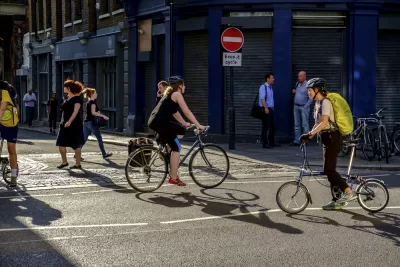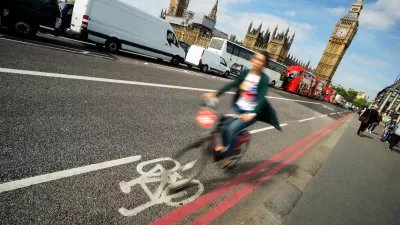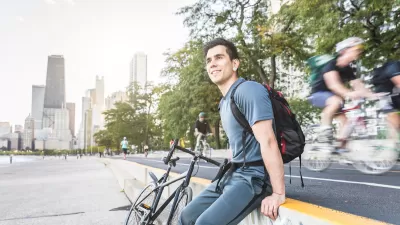A new study outlines the potential economic, environmental, and public health benefits of increasing cycling mode share in London, which has pledged to achieve net-zero emissions by 2030.

According to a report from Transport for the Quality of Life, tripling bicycle mode share in London would "save lives, create jobs and result in an annual economic dividend of $6.5 billion," in addition to environmental benefits and traffic reduction, writes Carlton Reid.
A TfL analysis from 2016 suggested that 3.1 million daily car driver trips and 1.6 million car passenger trips in London could be switched to cycling or walking. More than half of these trips are less than 3 kilometers in length, and it is often far quicker to cycle than to drive in Central London where motoring speeds have barely increased since the days of the horse and cart.
The city has pledged to reach net-zero emissions by 2030, and boosting bicycling could help achieve that goal and create economic benefits. "Investment in cycleways was one of the best ways of creating jobs through infrastructure spend, more than any other infrastructure project aside from energy efficiency in buildings, reported the TUC’s 2020 study." But without additional funding, London's transportation system will have to make service cuts and end investment in active travel projects, says another report prepared for Transport for London's finance committee.
The report estimates that with robust government support and investment in infrastructure, cycling mode share could grow from 2 percent to 14 percent of trips by 2030.
FULL STORY: Tripling Bicycle Use Would Pump $6.5 Billion Into London’s Economy Each Year, Says Report

Alabama: Trump Terminates Settlements for Black Communities Harmed By Raw Sewage
Trump deemed the landmark civil rights agreement “illegal DEI and environmental justice policy.”

Study: Maui’s Plan to Convert Vacation Rentals to Long-Term Housing Could Cause Nearly $1 Billion Economic Loss
The plan would reduce visitor accommodation by 25% resulting in 1,900 jobs lost.

Why Should We Subsidize Public Transportation?
Many public transit agencies face financial stress due to rising costs, declining fare revenue, and declining subsidies. Transit advocates must provide a strong business case for increasing public transit funding.

Paris Bike Boom Leads to Steep Drop in Air Pollution
The French city’s air quality has improved dramatically in the past 20 years, coinciding with a growth in cycling.

Why Housing Costs More to Build in California Than in Texas
Hard costs like labor and materials combined with ‘soft’ costs such as permitting make building in the San Francisco Bay Area almost three times as costly as in Texas cities.

San Diego County Sees a Rise in Urban Coyotes
San Diego County experiences a rise in urban coyotes, as sightings become prevalent throughout its urban neighbourhoods and surrounding areas.
Urban Design for Planners 1: Software Tools
This six-course series explores essential urban design concepts using open source software and equips planners with the tools they need to participate fully in the urban design process.
Planning for Universal Design
Learn the tools for implementing Universal Design in planning regulations.
Smith Gee Studio
Alamo Area Metropolitan Planning Organization
City of Santa Clarita
Institute for Housing and Urban Development Studies (IHS)
City of Grandview
Harvard GSD Executive Education
Toledo-Lucas County Plan Commissions
Salt Lake City
NYU Wagner Graduate School of Public Service





























